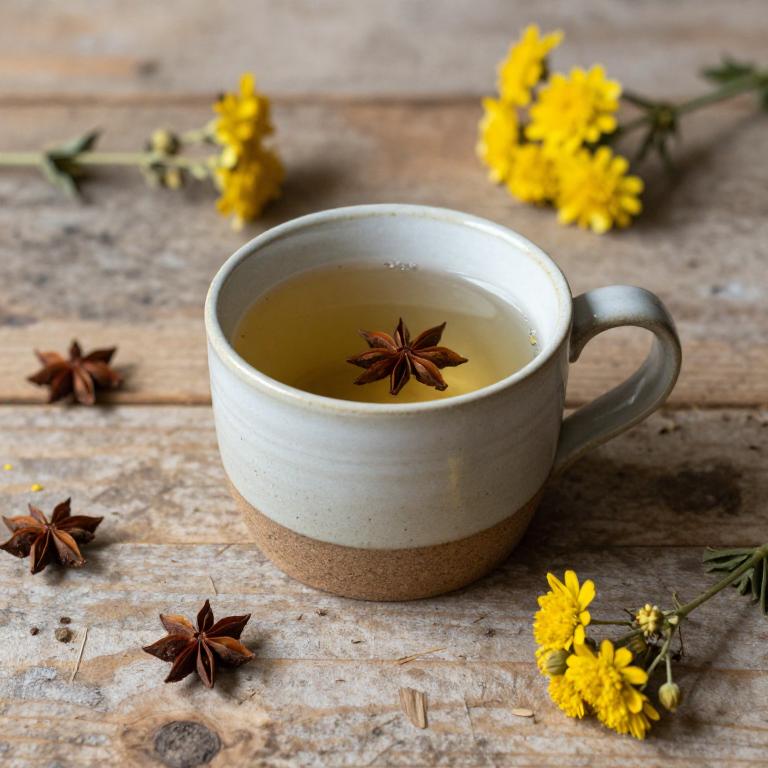10 Best Herbal Teas For Diarrhea

Herbal teas can be a soothing and natural remedy for diarrhea, offering relief without the harsh side effects of over-the-counter medications.
Chamomile, peppermint, and ginger are commonly recommended for their calming and anti-inflammatory properties that help ease digestive discomfort. These teas work by reducing gut irritation and promoting a healthier digestive environment. They are generally safe for most adults, though individuals with specific allergies or medical conditions should consult a healthcare provider before use.
Incorporating herbal teas into a balanced diet and staying hydrated can support recovery and prevent dehydration during episodes of diarrhea.
Table of Contents
- 1. Camellia (Camellia sinensis)
- 2. Ginger (Zingiber officinale)
- 3. Anise (Pimpinella anisum)
- 4. Fennel (Foeniculum vulgare)
- 5. Peppermint (Mentha piperita)
- 6. Cumin (Cuminum cyminum)
- 7. Dog rose (Rosa canina)
- 8. Lemon grass (Cymbopogon citratus)
- 9. Thyme (Thymus vulgaris)
- 10. Echinacea (Echinacea purpurea)
1. Camellia (Camellia sinensis)

Camellia sinensis, the plant from which green and black teas are derived, contains compounds such as polyphenols and caffeine that may have mild therapeutic effects.
While it is not traditionally used as a primary treatment for diarrhea, some studies suggest that the antioxidants in Camellia sinensis may help reduce inflammation in the digestive tract. However, caffeine and tannins in tea can sometimes exacerbate diarrhea in sensitive individuals, so it is advisable to consume it in moderation. Herbal teas made from Camellia sinensis are often recommended for their calming properties, but they should not replace medical treatment for persistent or severe diarrhea.
It is always best to consult a healthcare professional before using herbal teas as a remedy for gastrointestinal issues.
2. Ginger (Zingiber officinale)

Zingiber officinale, commonly known as ginger, is widely used in herbal teas to help alleviate symptoms of diarrhea due to its anti-inflammatory and antimicrobial properties.
The active compounds in ginger, such as gingerol and shogaol, can help reduce intestinal inflammation and ease digestive discomfort. Drinking ginger tea can also help soothe the stomach and promote the expulsion of excess gas, which may contribute to diarrhea. It is often recommended to consume ginger tea in moderation, as excessive intake may irritate the stomach in some individuals.
Overall, ginger herbal tea is a natural and effective remedy for managing mild cases of diarrhea when used as part of a balanced approach to digestive health.
3. Anise (Pimpinella anisum)

Pimpinella anisum, commonly known as anise, is a herb often used in herbal teas to help alleviate symptoms of diarrhea.
The seeds of this plant contain compounds such as anethole, which have mild antispasmodic and carminative properties that can soothe the digestive system. Drinking anise tea may help reduce intestinal cramps and ease the frequency of bowel movements associated with diarrhea. It is typically prepared by steeping the dried seeds in hot water for several minutes, and it is often consumed warm.
However, while anise tea may offer some relief, it should not replace medical treatment for severe or persistent diarrhea.
4. Fennel (Foeniculum vulgare)

Foeniculum vulgare, commonly known as fennel, is often used in herbal teas to help alleviate symptoms of diarrhea due to its carminative and antispasmodic properties.
The seeds of the fennel plant contain essential oils, such as anethole, which can help soothe the digestive tract and reduce intestinal cramping. Drinking fennel tea may help regulate bowel movements and ease discomfort associated with digestive upset. It is typically prepared by steeping dried fennel seeds in hot water for several minutes, and can be consumed warm or cooled.
While fennel tea is generally considered safe for most adults, it is advisable to consult a healthcare professional before using it, especially for children or individuals with existing medical conditions.
5. Peppermint (Mentha piperita)

Mentha piperita, commonly known as peppermint, is a popular herb used in herbal teas to alleviate symptoms of diarrhea.
The essential oils in peppermint, particularly menthol, have a soothing effect on the digestive system, helping to reduce intestinal spasms and inflammation. Peppermint tea can help ease cramping and bloating associated with gastrointestinal distress, making it a natural remedy for mild to moderate cases of diarrhea. It is typically consumed warm and can be combined with other herbs like ginger or licorice for enhanced effectiveness.
However, it is important to consult a healthcare provider before using peppermint tea, especially for children, pregnant women, or those with certain medical conditions.
6. Cumin (Cuminum cyminum)

Cuminum cyminum, commonly known as cumin, is a popular herbal ingredient used in teas to aid digestion and alleviate symptoms of diarrhea.
The essential oils in cumin, such as limonene and cumin aldehyde, possess antimicrobial and carminative properties that can help reduce intestinal inflammation and promote healthy digestion. Drinking cumin tea can help soothe the gastrointestinal tract and ease frequent bowel movements associated with diarrhea. It is often recommended to consume cumin tea with warm water or milk for better absorption and enhanced flavor.
However, individuals with severe diarrhea should consult a healthcare professional before using cumin as a natural remedy.
7. Dog rose (Rosa canina)

Rosa canina, also known as rosehip, is a traditional herbal remedy that has been used for centuries to support digestive health.
Its high content of bioflavonoids, vitamin C, and other antioxidants may help reduce inflammation in the gastrointestinal tract, making it potentially beneficial for individuals experiencing diarrhea. Rosehip tea is typically prepared by steeping dried rosehips in hot water, and it is often consumed warm to soothe the stomach and promote gentle digestion. While it is generally considered safe for most people, it is important to consult a healthcare provider before using it, especially for those with underlying health conditions or who are taking medications.
Overall, rosa canina herbal tea may offer a natural and soothing option for managing mild digestive discomfort associated with diarrhea.
8. Lemon grass (Cymbopogon citratus)

Cymbopogon citratus, commonly known as lemon grass, is a popular herbal tea used for its soothing and digestive properties.
This herb contains essential oils, flavonoids, and other bioactive compounds that help in reducing inflammation and improving gut motility. Lemon grass tea is often recommended for alleviating symptoms of diarrhea due to its antimicrobial and anti-inflammatory effects. It can help regulate bowel movements and ease discomfort associated with gastrointestinal distress.
However, it is advisable to consult a healthcare professional before using lemon grass tea, especially for prolonged or severe cases of diarrhea.
9. Thyme (Thymus vulgaris)

Thymus vulgaris, commonly known as thyme, is often used in herbal teas to support digestive health, including the treatment of diarrhea.
The essential oils in thyme, particularly thymol, have antimicrobial properties that can help combat harmful bacteria in the gastrointestinal tract. When brewed into a tea, thyme can soothe the digestive system and reduce inflammation, making it a natural remedy for mild cases of diarrhea. However, it is important to consult a healthcare provider before using thyme tea, especially for prolonged or severe diarrhea, as it may interact with certain medications.
While thyme tea is generally safe for most people, excessive consumption could lead to gastrointestinal discomfort or allergic reactions in some individuals.
10. Echinacea (Echinacea purpurea)

Echinacea purpurea, commonly known as purple coneflower, is a popular herbal remedy often used to support immune function.
While it is traditionally used for colds and infections, some studies suggest it may also have potential benefits for digestive health. Echinacea herbal teas are believed to possess anti-inflammatory and antimicrobial properties that could help alleviate symptoms of diarrhea by reducing intestinal irritation and fighting harmful pathogens. However, more research is needed to fully understand its efficacy in treating diarrhea specifically.
As with any herbal remedy, it is advisable to consult a healthcare professional before using echinacea, especially for prolonged periods or in combination with other medications.